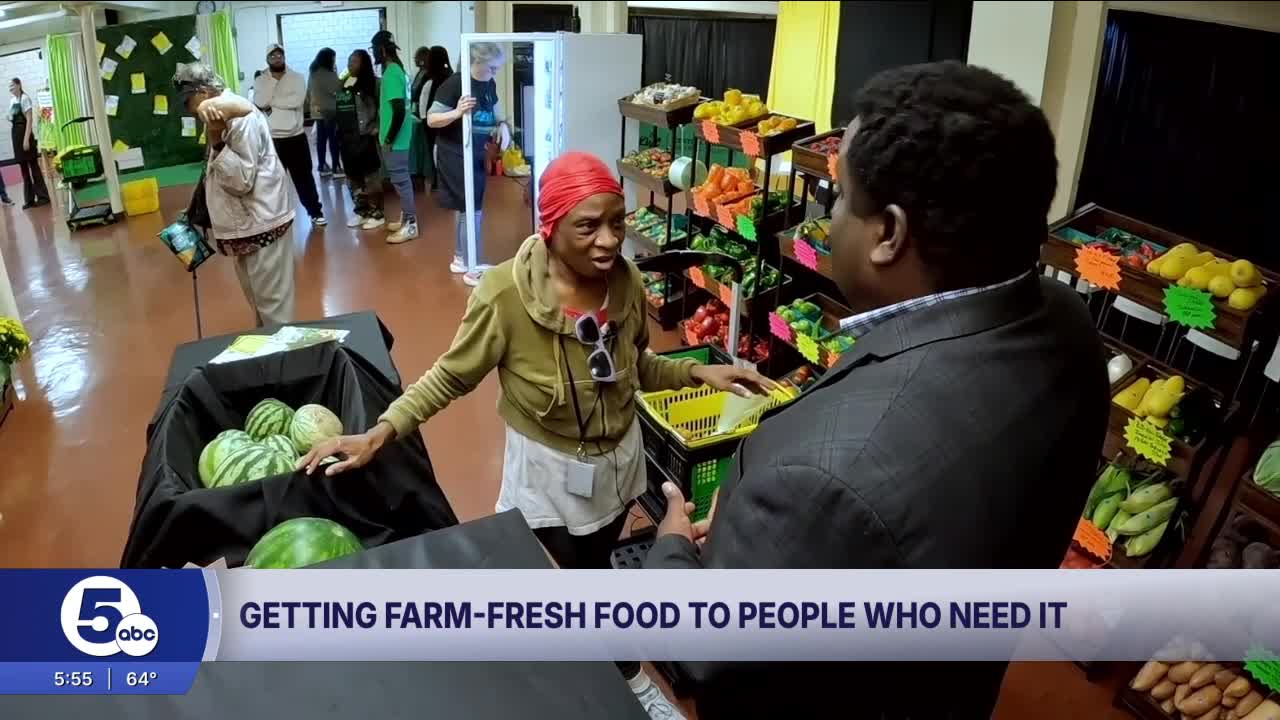CLEVELAND — A new idea is taking root in Cleveland to bring fresh, healthy foods closer to families who need them most.
On a sidewalk in front of Shiloh Baptist Church in the city’s Central neighborhood, a woman with a microphone in hand announced, “Fresh fruits and vegetables!” inviting people inside the church to see and shop at the Central Kinsman Wellness Collective’s Farm Stop.
Think of it as a farmers' market meets a small grocery store. It’s a pilot program that began Oct. 16 and will continue Saturday from 9 a.m. to 6 p.m. and Sunday from noon to 6 p.m. at the church at 5500 Scovill Ave.

“The Central Kinsman Wellness Collective is a group of residents, nonprofits and community organizers who have been concerned about food injustice in this community and have been working for years to imagine a new way of providing healthy food to our residents and address the social determinants of health,” said Rev. Dr. Lisa Goods of Shiloh Baptist Church.
Aharon Ben-Keymah is the founder of T.H.E. U.A.I. Farm — the acronym stands for Teaching Humanity Excellence Urban Agriculture Initiative. He’s part of the collective, one of a dozen local farmers and producers selling the fruits of their labor at the Farm Stop.
“Look how fresh these carrots are,” Ben-Keymah said to me as he pointed to crates holding his produce. “Peppers, tomatoes, Swiss chard, arugula (and) mustard greens. You see some of them right here. All of these are very healthy for the mind, body and soul.”
“I mean, this is straight from your garden, going to people's homes. How does that make you feel?” I asked him.
“It’s invigorating because it gives me the ability to actually provide a solution to the community,” Ben-Keymah said.
The Black-owned co-op is trying to tackle a problem many in the Central and Kinsman neighborhoods know all too well — a food desert.
“The Dave’s Market in this neighborhood moved out in 2019,” Goods said. “This is Cleveland's lowest-income neighborhood where people don't always have transportation to get to other neighborhoods to shop, and so they're shopping at the corner store."
Walter Patton, a partner with the Central Kinsman Wellness Collective, said the Farm Stop is proof of what’s possible when people come together. He hopes it will spur more investment to bring about a permanent location where people need it most.
“My hope going forward is that it's consistent and that it's a space that we can go to every day,” Patton said.
He pointed to the economic challenges of the area, the lack of access to fresh, healthy foods and their impact on people's minds and bodies.
“So you can imagine that all social determinants that help come with that, and food access is one of them that is causing a lot of violence in the community,” Patton said. “The Central Kinsman Wellness Collective is a part of the solution. We only get media coverage for problems in this community. So it's an amazing thing that you're out here giving us media coverage for what's going on today.”
I had a chance to talk with shopper Lavette Jackson, who lives not far from the church.
“I see cabbage. You have squash. You have peppers,” Jackson said. “You have some unique things. You want accessibility. You want fresh vegetables and you want produce. You want the same things that you have when you travel afar."
She was looking forward to trying Ben-Keymah’s orange watermelon and enjoyed learning about it straight from him.
"I was able to ask a question and he was able to educate me on the difference,” Jackson said.
Cash, cards and EBT (SNAP benefits) are all accepted.
“One of the primary values of the group as a whole is dignity in a shopping experience, and so being able to create that together and show that it’s possible I think has been awesome,” said Morgan B. Parks, a partner with the Central Kinsman Wellness Collective.
For Ben-Keymah, farming isn’t just a job — it’s personal. He told me that being caught with a stolen gun, going through the courts and community service led him to cultivating.
"What makes a super villain a villain? They use their powers for bad. What makes a superhero? He uses powers for good.” Ben-Keymah said.
The Farm Stop is collecting feedback and data as the search for more funding, support and a permanent location continues.
“When we all come together, we have the power to change systems, to change the narratives in our community, and make our communities a better place,” Goods said.





